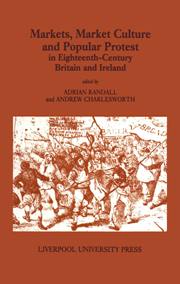Book contents
- Frontmatter
- Contents
- Contributors
- Preface
- 1 Markets, Market Culture and Popular Protest in Eighteenth-Century Britain and Ireland
- 2 Popular Protest and the Persistence of Customary Corn Measures: Resistance to the Winchester Bushel in the English West
- 3 The Jack-a-Lent Riots and Opposition to Turnpikes in the Bristol Region in 1749
- 4 The Cider Tax, Popular Symbolism and Opposition in Mid-Hanoverian England
- 5 Scarcity and the Civic Tradition: Market Management in Bristol, 1709–1815
- 6 The Moral Economy of the English Middling Sort in the Eighteenth Century: the Case of Norwich in 1766 and 1767
- 7 Oxford Food Riots: a Community and its Markets
- 8 The Irish Famine of 1799–1801: Market Culture, Moral Economies and Social Protest
- Index
3 - The Jack-a-Lent Riots and Opposition to Turnpikes in the Bristol Region in 1749
- Frontmatter
- Contents
- Contributors
- Preface
- 1 Markets, Market Culture and Popular Protest in Eighteenth-Century Britain and Ireland
- 2 Popular Protest and the Persistence of Customary Corn Measures: Resistance to the Winchester Bushel in the English West
- 3 The Jack-a-Lent Riots and Opposition to Turnpikes in the Bristol Region in 1749
- 4 The Cider Tax, Popular Symbolism and Opposition in Mid-Hanoverian England
- 5 Scarcity and the Civic Tradition: Market Management in Bristol, 1709–1815
- 6 The Moral Economy of the English Middling Sort in the Eighteenth Century: the Case of Norwich in 1766 and 1767
- 7 Oxford Food Riots: a Community and its Markets
- 8 The Irish Famine of 1799–1801: Market Culture, Moral Economies and Social Protest
- Index
Summary
In 1754, a correspondent to the Gentleman's Magazine argued a case for good roads when he wrote, ‘Whatever quickens and cheapens the transportation of goods, and makes their migration more easy from place to place, must of course render a state more wealthy.’ For the most part the correspondent was referring to good turnpike roads where ‘smoothness, spaciousness and the advantage of celerity in passage’ achieved these objectives. Popular opposition to turnpikes in certain localities throughout the first half of the eighteenth century suggests that others had a less optimistic view of such highways and the trusts that administered them.
Turnpike trusts were set up by Act of Parliament. Groups of local people (trustees) were thereby granted temporary powers to maintain and upgrade defined stretches of road, the cost of which was borne by charging tolls at gates along the route. As Langford notes, ‘By 1770 they covered 15,000 miles of road, administered by more than five hundred separate trusts’. Opposition sprang from the fact that, as Langford and others have pointed out, the tolls charged were ‘in the nature of a tax, supplementing one form of highway rate with another’, for the trusts operated on roads which ‘were usually ancient thoroughfares, previously maintained by statute labour and travelled free by all who used them’. It is important to emphasize that ‘before the eighteenth century the highway was not so much an actual body of land reserved and maintained for the convenience of traffic as a “right of passage” for every subject of the Crown over another's land’.
- Type
- Chapter
- Information
- Publisher: Liverpool University PressPrint publication year: 1996
- 1
- Cited by



